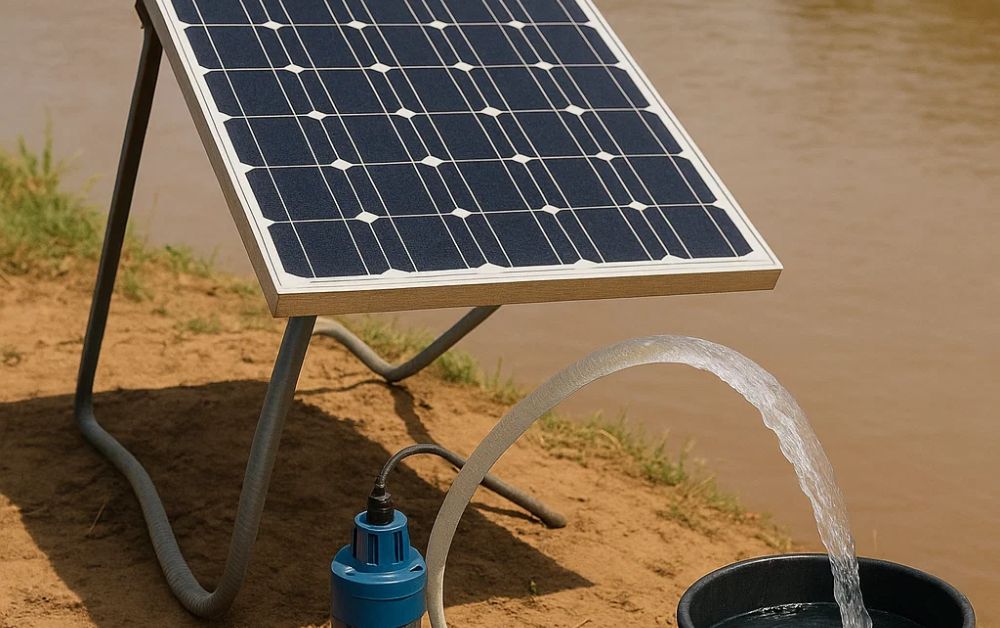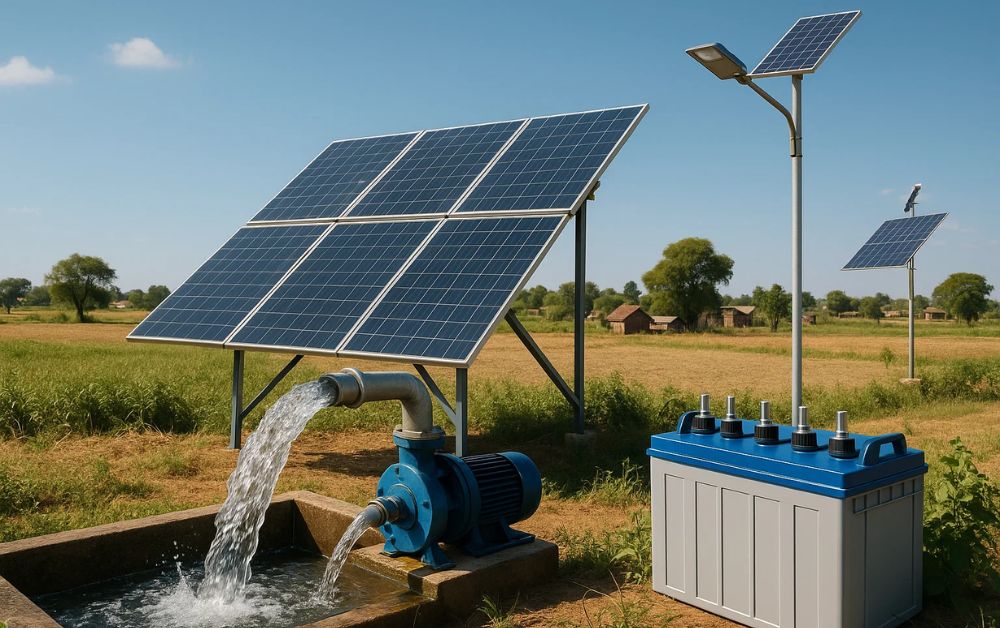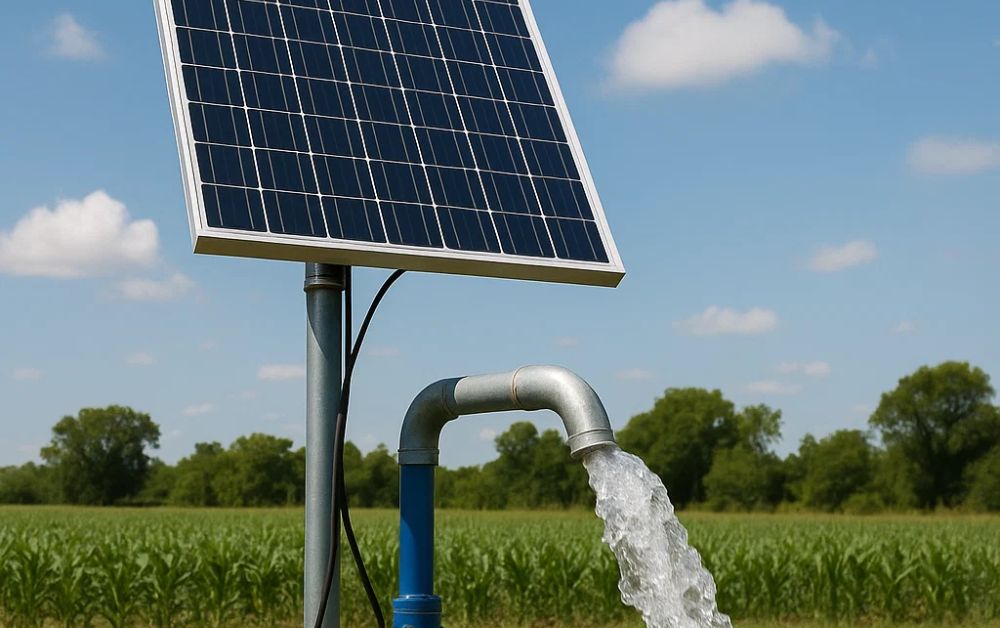Agriculture is one of the most climate-exposed sectors of the world with climate change. Whether it is uneven rain or persistent drought, farmers struggle to maintain productivity. Climate-resilient agriculture is no longer an option to ensure livelihood and food security. One of the technological revolutions that has been emerging as a game-changer in this regard is the solar water pumping system. Using the sun’s energy, such systems are an affordable, climate-friendly, and sustainable way of irrigating crops and, hence, a leading force in the global transition towards climate-resilient agriculture.
Introduction
Agriculture has always been intricately tied to the weather, yet the accelerating pace of climate change has more than doubled uncertainty in rainfall, temperature, and water availability. These alterations decrease crop yields and threaten the lives of millions of smallholder farmers, especially in developing nations. The agricultural sector is transforming by adopting revolutionary technologies like solar power to address these issues. Among them, solar water pumping systems have been a game-changer for efficient irrigation without increasing environmental impact.
In this blog, we talk about the use of solar water pumps for climate-resilient agriculture, how they make farming sustainable, and why they are an investment for the future of farmers worldwide.

The Growing Need for Climate-Resilient Agriculture
Climate-resilient agriculture can adapt to climate variability, reduce greenhouse gas emissions, and enhance sustainability. Water availability is a crucial aspect of resilience. With traditional water sources no longer as dependable due to changing rain patterns, farmers are increasingly turning to other options to offer stable irrigation.
Diesel and electric pumps have been the common ones used for groundwater pumping for irrigation because both have their shortcomings. Diesel pumps are costly to operate and emit poisonous gases, and electric pumps are grid supply dependent, which might not always be available or reliable in remote areas. Solar water pumping systems answer these needs here — yielding autonomy, inexpensive operation, and a clean power source.
What are Solar Water Pumping Systems?
Solar water pumping systems use solar power from sunlight using photovoltaic (PV) panels and supply electricity to power a motor for pumping water from wells, boreholes, rivers, or storage tanks. Depending on the water source and depth, they can be submersible or surface.
The key components typically include:
- Solar PV panels
- Pump controller/inverter
- Electric motor
- Water pump
- Storage tank or direct irrigation setup
These pumps are suitable for drip irrigation, sprinkler application, or direct crop watering and, hence, are highly versatile to meet the needs of different types of farming.
Advantages of Solar Water Pumps in Farming
Ecological Friendly
Solar water pumps have no emissions, thus reducing agriculture’s carbon footprint. They are not fossil fuel or carbon-based grid electricity-dependent.
Cost-Efficient in the Long Term
Even though the upfront installation cost may be higher than that of conventional pumps, solar pumps virtually have zero running costs. Sunlight, once trapped, is free of cost, and running costs are drastically reduced.
Reliable Water Supply
Especially in sunny regions, solar pumps ensure consistent irrigation during the day. Such predictability guarantees consistent crop yield even during prolonged droughts.
Low Maintenance Costs
Compared to diesel or electric pumps, solar water pumps have fewer moving components, lower maintenance requirements, and fewer breakdowns.
Perfect for Off-Grid Areas
Where there is no access to grid electricity or a reliable source of fuel, solar water pumping systems provide freedom and independence, thus being perfect for off-grid rural areas.
Function in Climate-Resilient Agriculture
Solar water pumps are directly involved in assisting in climate resilience in several critical ways:
- Water Conservation: With efficient irrigation systems like drip or sprinklers, solar pumps maximize each drop, avoiding wastage and conserving groundwater.
- Year-Around Production: Farmers can grow crops year-round with guaranteed irrigation, increasing food security and income stability.
- Crop Diversification: Access to reliable water encourages farmers to diversify beyond traditional rain-fed crops, reducing dependence on rain seasons.
- Reduced Greenhouse Gas Emissions: With diesel fuel replacement, solar pumps minimize emissions, aligning with global climate goals.
- Enhancing Smallholder Farmers: Affordable and scalable solar water pumping schemes allow small-scale farmers to become economically resilient to environmental and economic stresses.
Government and Global Support
Aware of the potential for solar irrigation to foster sustainable agriculture, numerous governments and global institutions are funding solar water pump adoption. Subsidies, soft loans, and technical training schemes are implemented to make the technology affordable.
For example, programs in nations such as India, Kenya, and Ethiopia have been able to roll out thousands of solar pumps, revolutionizing the landscape of agriculture for increased resilience and productivity.
Challenges and Considerations
While promising, the bulk utilization of solar water pumps is not problem-free:
- High Upfront Cost: While reducing solar panel costs, the upfront cost remains a barrier for small farmers without financing.
- Technical Knowledge: Installation and servicing require technical knowledge, so farmers’ training and support are essential.
- Risk of Over-Abstraction of Groundwater: If proper water management is not done, over-reliance on pumping can lead to aquifer depletion, especially in water-scarce regions.
Policy, community, and integrated water management interventions aimed at these issues are key to achieving the full potential of solar water pumping systems.

Conclusion
The use of solar water pumps in climate-resilient agriculture is not just using clean energy — it’s developing a sustainable, food-secure future. Solar water pump systems offer a clever, scalable, and sustainable solution to one of modern agriculture’s most significant challenges: reliable access to water in a fluctuating climate.
By integrating solar water pumping systems into agriculture systems, farmers can mitigate climate change and find new opportunities for development and self-sustenance. If policy support, affordable financing, and promotion campaigns exist, solar pumps will become the foundation of climate-resilient agricultural systems globally.
As climate issues are becoming increasingly daunting, investment in renewable energy-based irrigation is no longer an option but a requirement.



